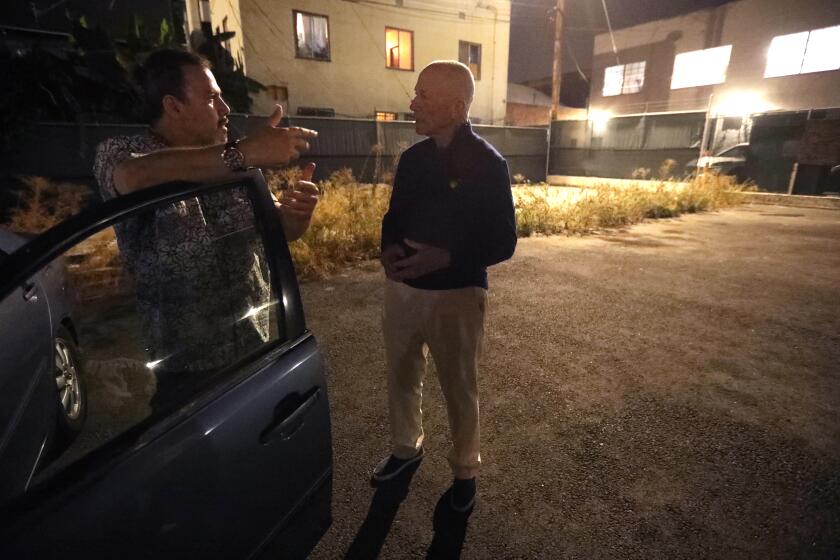Woman Who Feeds the Poor Faces Eviction
In the six years Dorothea Bradley has been feeding Pasadena’s poor from the back porch of her ramshackle home, she has never missed an opportunity to thumb her nose at bureaucratic detail.
Three years ago, when Pasadena officials asked her how much money she needed to expand her emergency food program, Bradley pulled the number $33,333.33 out of thin air. A few months later, a grant for that amount was awarded through the federal government.
When she was later informed that her program violated local zoning and health laws and would have to be shut down, Bradley told her story to the newspapers. It placed local officials in the untenable position of either closing a much-needed program for the poor or turning a blind eye to the violations. The officials “chose” the latter.
Now, just as Bradley prepares to move her food program to a Pasadena office building donated by the American Friends Service Committee, a Quaker organization, she finds herself in another quandary brought on by her disdain for paper work and administrative detail.
Bradley faces eviction from her house, which she had hoped to continue using as a food storage center. For seven years, the 40-year-old Bradley has been living as a squatter in the two-story frame house at 783 Earlham St. in Northwest Pasadena.
At first, she rented the home from a man who had purchased it with a loan from the federal Department of Housing and Urban Development. When the man failed to make his mortgage payments, HUD foreclosed on the property. But Bradley continued to live there, believing that she had at least tacit approval from the federal agency to do so.
Bradley says that with the help of the office of Rep. Edward Roybal (D-Los Angeles), she had several conversations in 1984 and 1985 with HUD officials in Washington and Los Angeles. Bradley says the officials told her of an obscure law that empowered the federal agency to make homes available, free of rent, to nonprofit organizations such as hers.
But Bradley, who abhors fine details and runs an admittedly seat-of-the-pants operation, never confirmed her conversations through letters or wrote down the names of the officials with whom she talked. She says she was too busy focusing on the big picture, feeding the poor and handicapped who were coming to her weekly food giveaways in ever greater numbers.
Then, in May of this year, HUD notified Bradley that she had 30 days to vacate. When Bradley refused, HUD took her to court. Last month, Pasadena Municipal Court Judge Phil Argento ruled that the federal agency had a legal right to evict Bradley.
But the judge stayed the eviction for 30 days, giving Bradley time to work out an arrangement whereby the City of Pasadena might buy the house and rent it to Bradley.
City officials say Bradley failed to follow through on the plan. The 30-day deadline passed last Monday without Bradley getting together with the city block grant officials who oversee her program and administer HUD money.
Any day now, county marshals acting at the behest of HUD can post a writ of possession on the house and forcibly remove Bradley five days later.
HUD officials were unavailable to answer why--after seven years--they suddenly decided to move to evict Bradley. Bradley says the action by the federal agency is ironic: One arm of HUD has kept her program alive through generous funding, while another arm is taking away an important link in the program.
“Even though the city decides who gets HUD money and who doesn’t, HUD does oversee my program and it’s their money,” she said. “It’s like one hand not knowing what the other hand is doing.”
But city officials say it is Bradley’s inattention to detail that has gotten her into trouble.
“She never worked to get a commitment from Pasadena to buy the house,” said Geraldine Sport, an administrator for the Community Development Block Grant program. “I called HUD last week and was surprised to find out that the extra deadline they had given her was about to pass.
“If Dorothea finds something unpleasant, she just avoids it. She’s got a great program, but she refuses to face facts. If an eviction was looming over my head, I’d do everything to beat it. Her response is just to ignore the problem.”
Bradley acknowledges as much. She says she has been so consumed with helping feed the poor in the aftermath of the Oct. 1 earthquake that she has had little time for anything else.
“If a man is hungry and handicapped, that’s what you have to take care of. That has to be my priority,” she said. “If I get kicked out of the house, I get kicked out of the house. There’s only so much I can do about it.
“I don’t know why people pick on me. I spend most of my time in the fields picking vegetable or in stores gathering food.”
Besides meeting the increased demand for food following the earthquake, Bradley said that she has been scrambling during the past two weeks trying to spend a $16,000 grant from the Federal Emergency Management Administration. Whatever she could not spend in two weeks, she would have to return to the federal agency.
“I spent it all,” Bradley said. “I bought four tons of chicken, turkey, fish and sweet potatoes.”
But Sport and others believe that Bradley might be jeopardizing her program by ignoring details that could prevent her eviction. “She is cutting off her nose to spite her face,” Sport said. “What do you do with a person like that?”
Bradley, who has a doctorate in behavioral psychology and speaks seven languages--including Mandarin, Cantonese, Italian and several African dialects--last year handed out more than 20,000 boxes filled with fresh fruits, vegetables, meats and grocery items.
She asks for a $5 donation for items worth more than $30. It’s her way of instilling pride in the poor and handicapped who line up outside her home every week.
Later this month, Bradley will begin distributing food from the donated office building at 980 N. Fair Oaks Ave. But she still needs the Earlham Street house for storage.
Bradley is hoping local HUD officials will give her more time to work out an arrangement. She has made a personal appeal to Roybal’s office and has written HUD Secretary Samuel R. Pierce Jr.
Bradley said she is willing to rent the house or another HUD-owned house. But, so far, the federal agency has refused to consider such an option.
“I’m hoping we can work something out,” she said. “I can’t believe that they’re going to drag me from this place screaming.”



